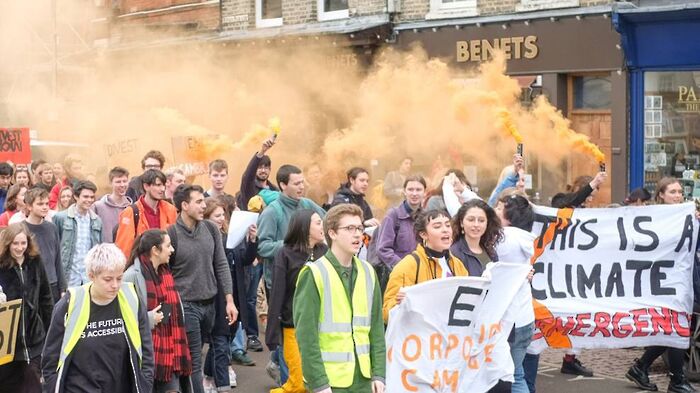Online organising should not be underestimated
Holly Beveridge argues that student activists have uncovered untapped potential in online organising, despite the criticisms of older generations

“He thinks you’re a snowflake because of your sensitivity to cultural banalities.” This was a text I received this week from my Dad, jokingly relaying the taunts of a family friend. I took it as light-hearted humour rather than character assassination.
Such accusations of cultural sensitivity now occupy at least a small portion of political commentary. Conversational themes ranging from cultural appropriation to sexist micro-aggressions now form a fundamental part of the political collective consciousness, particularly among younger generations. But critics remain divided in their response to youth mobilisation on these issues, or to what they perceive as the apparent lack of mobilisation.
Josh Glancy reflects on the phenomenon of ‘generation snowflake’ in response to the latest work by Greg Lukianoff and Jonathan Haidt, titled The Coddling of the American Mind. His initial conclusions upon joining a campus walk-out at Columbia University after the election of Donald Trump are disparaging. Therapy dogs, colouring books and Play-Doh provided by the University are all signs to Glancy of an increasingly de-radicalised student body. He asks how the spirit of 1968, when radical Columbia students fought the police to oppose gentrification, has been replaced by apparent mass hysteria.
Whilst social media is so quickly accused of creating an echo chamber, prompting fast but superficial responses, I have seen online interaction create real change
My own experience of student activists at Cambridge has been quite the opposite. A recent conversation concluded that protest appears to be getting increasingly more radical, gathering momentum from the past year’s events. In my first year, I saw students go on hunger strike to protest fossil fuel investments; occupy Senate House; barricade buildings; march on masse; set flares off bridges – the list goes on. In this institution at least, the drive to commit oneself is not a quality lacking, especially not in campaign groups.
If commitment isn’t the issue, what is? Lukianoff, Haidt and Glancy in turn point to the trend of ‘intolerance and fragility’ as the manifestation of modern campus radicalism. Critics accuse online culture of perpetuating this so-called sensitivity. In an age where we send birthday messages to old friends on the same platform as we organise political activism, the dilemma becomes the extent to which social media is and can be used effectively to create change.
As a tool to mobilise, it more than proves its worth. In an eight-week term that places both immense time and academic pressure on students, the ease of Facebook events and posts makes organising political events against a work timetable far simpler. While social media is accused of creating an echo chamber, prompting fast but superficial responses, I have seen online interaction create real change, and the possibilities are seemingly endless.
Of course there are pitfalls to online activist organising, but activists should not elect to avoid the potential issues present in online activism and sacrifice its huge potential. In fact, online organising complements what they do best: projecting enthusiasm, creating a structure to their campaigns, and urging people to get involved. After all, the alternative to projecting an enormous amount of content is nothing at all, which can hardly be the viable solution.
And so it seems then that online organising is neither a problem when it comes to student activism, and is all too often cited as an example of the passive nature of current student activism. What then is the issue so many critics really have with student activists today?
Glancy, like so many others, juxtaposes what is widely depicted as the mass hysteria of students – comforted by puppy therapies and welfare events – to a bygone age of radical student activism. Such a dichotomy is unproductive. Activists can be understanding and radical, appreciative of boundaries and willing to push the status quo. What’s more, organising this online does not diminish its impact. In our debates about the student activism of today, we must not deny students of their ability to be many things.
 Comment / The (Dys)functions of student politics at Cambridge19 January 2026
Comment / The (Dys)functions of student politics at Cambridge19 January 2026 Arts / Exploring Cambridge’s modernist architecture20 January 2026
Arts / Exploring Cambridge’s modernist architecture20 January 2026 Features / Exploring Cambridge’s past, present, and future18 January 2026
Features / Exploring Cambridge’s past, present, and future18 January 2026 Theatre / The ETG’s Comedy of Errors is flawless21 January 2026
Theatre / The ETG’s Comedy of Errors is flawless21 January 2026 News / Local business in trademark battle with Uni over use of ‘Cambridge’17 January 2026
News / Local business in trademark battle with Uni over use of ‘Cambridge’17 January 2026









